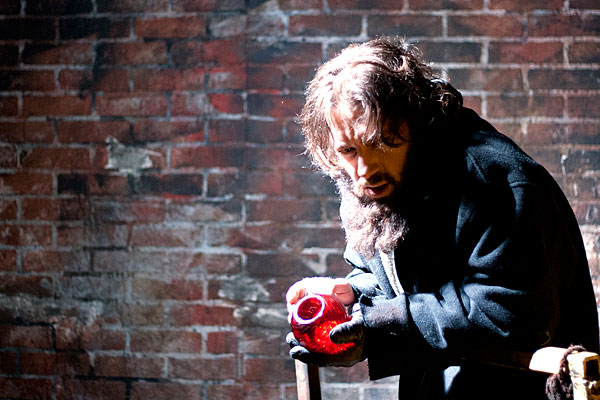
No matter how many times you’ve seen The Glass Menagerie (and I lost count years ago), there are revelations in store in Mary Arrchie Theatre’s inspired staging of Tennessee Williams’s enduring classic about the fragile, desperate dreams of an impoverished family in pre-World War II St. Louis.
Under Hans Fleischmann’s direction, The Glass Menagerie unfolds in unexpected and haunting ways. Unlike Williams’s traditional Tom Wingfield, a somewhat autobiographical successful writer reflecting on his traumatic past, Fleischmann’s interpretation (he pulls double duty playing Wingfield) is a gray-skinned homeless man shrouded in tattered clothing. He’s wholly engulfed by his troubles and trapped by internal demons that no amount of alcohol or escapist movies will relieve.
Wingfield’s demons stem from his family: his fragile sister Laura Wingfield (Joanne Dubach in a heartbreakingly effective performance), a young woman whose slight physical defect has left her an emotional cripple, and Amanda (Maggie Cain), the overbearing matriarch whose husband abandoned the clan years ago.
Amanda, who is insufferable in her desperation to ensure her daughter is provided for, is a portrait of a helicopter mom. She may be ultra-domineering, but her desires for her daughter are genuine. And her behavior is not unmerited—the depressed St. Louis of The Glass Menagerie is an abyss, black and yawning and waiting to swallow Laura up.
As for the titular glass Laura treasures, it isn’t the pretty animal figurines of most stagings. Her beloved “menagerie” is a gritty carnival of colored decanters, vials, and bottles. Shimmering behind them all is the portrait of Tom and Laura’s father, a grinning chimera whose absence has indelibly shaped the lives of the family he left behind.
Between Fleischmann's interpretation and the composer Daniel Knox’s persistent, sorrow-steeped original music, Menagerie is a gorgeous merger of sound, sight, and the aching Wingfields and their crumbled dreams.
The Glass Menagerie continues through February 17 at Mary Arrchie Theatre, 735 W. Sheridan Road. For more information, go to maryarrchie.com.
Catey Sullivan is Chicago magazine’s contributing theatre critic.
Photograph: Fred Bledsoe Photography


